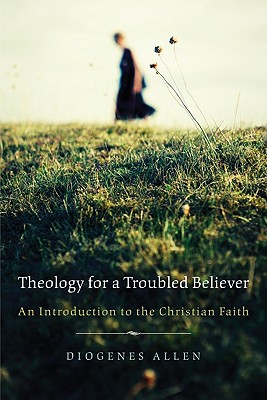Diogenes Allen: Theology for a Troubled Believer
 Diogenes Allen, Theology for a Troubled Believer: An Introduction to the Christian Faith (Louisville, KY: Westminster John Knox Press, 2010), 223 pages, ISBN 9780664223229.
Diogenes Allen, Theology for a Troubled Believer: An Introduction to the Christian Faith (Louisville, KY: Westminster John Knox Press, 2010), 223 pages, ISBN 9780664223229.
When I was first offered the opportunity to review Diogenes Allen’s new book, Theology for a Troubled Believer, I immediately welcomed the opportunity. While in graduate school, I had the great pleasure of having Dr. Allen as a Sunday School teacher and, consequently, eagerly looked forward to the opportunity to interact with him again. His teaching was, at the same time, profound, understandable, and practical. The mastery of a subject necessary to accomplish all three is not common. Dr. Allen, though currently retired, had a long and prestigious career as the Stuart Professor Emeritus of Philosophy at Princeton Theological Seminary. In addition, he holds the rare distinction of being ordained in both the Episcopal Church and the Presbyterian Church (USA).
While he engages most of the classical topics in systematic theology in this book, his approach is, to a degree, novel. This book is Allen’s extended response to questions posed to him by a thoughtful and intelligent man; a friend seeking to make sense of the world and, particularly, of the Christian faith in light of both the significant suffering that exists in the world and the fact that we live “in a world very different than the one inhabited by the biblical writers.” Allen’s goal is to aid his readers in gaining the skills necessary to put the various pieces of life’s puzzle together in a coherent fashion, to help them make more sense of the world through a Christian perspective, and to move them beyond simply a “notional” understanding of the faith to something more “real.”
With the idea of human suffering as his central theme, Allen addresses the major topics of classical Christian systematic theology. Not surprisingly, however, his somewhat unique purpose leads him to present these categories with varying amounts of emphasis and, to a degree, in an order outside of the ordinary. He starts with an investigation into the nature of God, challenging the philosophical ideas of how God must be, including some ideas that have been adopted by classic Christian theology. Allen gives significant attention to the holiness of God, focussing on the idea of God’s “transcendence,” which he calls “the essential quality of the Deity.” (The two chapters that Allen dedicates to this topic alone, in my opinion, is worth the price of the book!) It is a thoughtful, engaging, and masterful treatment of the Christian doctrine of holiness; both in the sense of that which is essential to God Himself and in the sense of how humanity, created in His image, is to manifest this holiness through the pursuit and establishment of justice. From there, Allen, who has received significant and numerous accolades for his work on the relation of faith and science, discusses what it means for God to be the Creator and the inherent limits of science to investigate Him. In this chapter, Allen, dismantles the commonly held “God-of-the-gaps” thesis that asserts that the concept of the divine is simply an historic, and now unnecessary, approach to explaining the heretofore mysterious.
The next major section, “The Divine Sacrifices,” contains Allen’s thoughts on a number of classic theological categories, including creation (which Allen asserts is the prototype of true human behaviour), human lostness, the Trinity, the Incarnation, the Temptation of Christ, and the Cross. Throughout this section, Allen ably and effectively weaves together insights from various thinkers and authors across the expanse of the last 2,000 years. Following that, in the section titled, “The New Life in God,” the author unpacks his understanding of salvation, which he asserts is not only grounded in the resurrection of Jesus but brings, consequently, not just life but a new kind of life not only filled with but the product of the life of God Himself. God’s purpose and priority in the work of salvation is to share His divine life with humanity. While traditional evangelical systematic theology tends to introduce the definition of faith early on in system, Allen saves that topic until much later. When he finally does introduce it, he asserts that, contrary to popular opinion, faith and reason are not mutually exclusive. Instead, both are necessary aspects of Christian belief. The question is not, then, “Which one is the true Christian practice?” but “How do the two relate and contribute to Christian discipleship?”
Category: In Depth, Pneuma Review, Winter 2012


